BaltSe@nioR
Insufficient market placement for seniors
Although almost 20% of the EU population is 65 years old or more, the market for furniture adapted to the seniors’ needs is still fragmented. At the same time, there are great design traditions in the Baltic Sea region: the furniture industry develops here five times faster than in other part of the EU. Germany and Poland are among the world’s leaders in producing and exporting furniture; together with Sweden, these countries also rank high in the industrial design.
Yet, owners of furniture companies have little understanding and knowledge how to design furniture that would increase the seniors’ comfort and security in home environment. By failing to meet the changing demands of aging societies, companies miss considerable business opportunities.
Innovating the approach
With applying a cross-sectoral approach and product development methods based on design thinking and open innovation, owners of companies, designers and architectures can boost their competitiveness in the Baltic Sea region and beyond. A big chance for enterprises can be a big win for seniors: better designed furniture incorporating smart solutions ensure a higher life quality and independence in home environment.
Budgets
in numbers
-
2.39MillionTotal
-
1.72MillionErdf
-
0.00MillionEni + Russia
-
0.10MillionNorway
Achievements
Needs and preferences of seniors do matter
Experts from Estonia, Denmark, Finland, Germany, Latvia, Lithuania, Norway, Poland and Sweden worked together in the project BaltSe@nioR, and paved the way for the furniture industry, in particular small and medium sized enterprises, to better adapt their market offer for the elderly.
Baltse@nioR has developed a profile of an elderly as a customer that can serve any enterprise manufacturing furniture or serving seniors otherwise in product customisation. 90 companies from 12 countries identified their challenges when producing products for seniors. In a knowledge database, the project collected feedback from more than 3,000 seniors from Denmark, Finland, Germany, Latvia, Lithuania, Poland and Sweden on their preferences in using kitchen, bedroom and upholstery furniture, as well as on their IT skills and economic conditions of households.
Virtual library for real-life benefits
The project created a one-stop shop for furniture manufacturers and others interested in seniors as customers. More than 230 registered users: designers, engineers, architects, health experts, furniture industry journalists and entrepreneurs from furniture manufacturing companies from 18 countries access new databases, research results from seven countries around the Baltic Sea, safety requirements for the furniture construction, design methods, new tools and prototypes developed by the project.
Let’s test together
Students and young professionals from Poland, Estonia, Latvia, Lithuania, Denmark, Sweden, Finland, Germany and Norway tested new design, such as gigamapping or shadowing to get inspired to reshape the future furniture market. Now, these methods are part of the educational process of Poznan University of Life Sciences, Art Academy of Latvia and Tallinn University of Technology. Whereas the result of joint innovation camps and design workshops are several prototypes of furniture incorporating smart IT solutions that increase the seniors’ safety. For example, a magic mirror displays personalised messages, a ReAbleChair collects data on sit-to-stand movements, a smart chair helps in physical rehabilitation, and a mobile robot with the fall detection and stand-up support function.
The prototypes serve as an incentive for designers to design smarter and, by this, to gain a competitive advantage on the furniture market. The project directly supported as many as 40 companies, and involved many more into testing, workshops and business exchange events.
More than 100 seniors and their caregivers tested these novelties in real home environments in Ulvila and Pori (Finland), whereas enterprises from the furniture, IT and healthcare sectors validated the functionality of the tools, such as a virtual library and a 3d printed age-simulator. The collected feedback helped, for example, improve the mobile robot, and triggered further amendments to prototypes that could serve the needs of seniors in public space better, a niche picked by the follow up project BaltSe@nioR 2.0.
Interreg helps improve the quality of life
Thanks to EUR 1.72 million support from the European Union, the Interreg project Balts@nioR provided furniture manufacturers with knowledge and tools to customise their products for seniors. In this way, Balts@nioR increased the competitiveness of furniture sector across the Baltic Sea region and triggered producing safer and more comfortable furniture for seniors, which improve their quality of life and independence in home environment. Now, the follow-up project BaltSe@nioR 2.0 strives for changing public spaces into age-friendly areas, making use of all knowledge and tools in place.
Outputs
Virtual Library
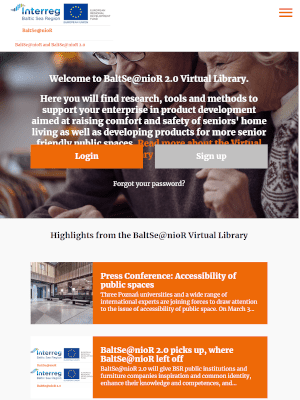
New, improved product development methods
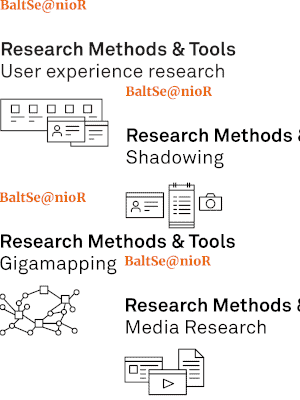
Knowledge database on the seniors’ preferences
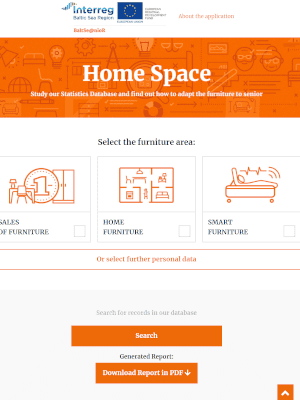
Knowledge database on reliability and warranty
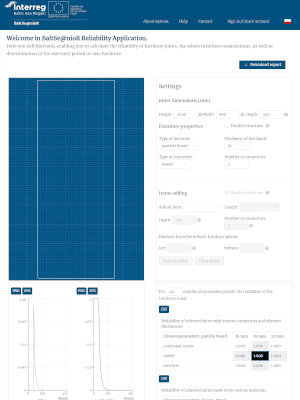
Prototypes of furniture for seniors
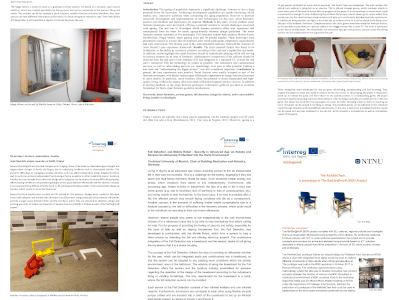
Project Stories
-
13.08.2020
Interreg empowers young generation to design a better future
Beata Fabisiak, project manager of the Interreg BaltSe@nioR and BaltSe@nioR 2.0 projects, explains how empowering young people brings multiple benefits: from driving economy to responding to major societal challenges. BaltSe@nioR and BaltSe@nioR 2.0 are great examples how young Europeans from different countries around the Baltic Sea can learn from each other to design a better future for Europe and its citizens.Read full story -
14.06.2018
Baltic Sea region as a design comfort zone for seniors
Despite the progressing age of communities in the Baltic Sea region, needs of the elderly are not being sufficiently addressed by producers of furniture and home equipment. In the project BaltSe@nior co-financed by Interreg Baltic Sea Region, by developing prototypes of intelligent furniture and upgrading design trends, companies are offered thriving opportunities to develop more suitable products for the elderly.Read full story -
20.12.2016
Let´s make the Baltic Sea Region a better place for seniors
It is said that people lose one cm of their height with every decade after turning 40. At some point, a favourite cup placed in the kitchen’s upper cupboard can become out of reach and a comfortable armchair is suddenly too high. These and other physical limitations may appear trivial to a young and healthy 20-year-old but they are a real challenge to an elderly person who wants to stay independent as long as possible.Read full story
Partners
Poznan University of Life Sciences
- TownPoznań
- RegionPoznański
- CountryPoland
- RepresentativeBeata Fabisiak
- Phone
- E-Mail
- Web
Development Centre UMT
- TownHerning
- RegionVestjylland
- CountryDenmark
- RepresentativeJoan Knudsen
- Phone
- E-Mail
- Web
Art Academy of Latvia
- TownRiga
- RegionRīga
- CountryLatvia
- RepresentativeVineta Kreigere
- Phone
- E-Mail
- Web
Ukmergė District Municipality Administration
- TownUkmergė
- RegionVilniaus apskritis
- CountryLithuania
- RepresentativeRima Boškevičienė
- Phone
- E-Mail
- Web
Tallinn University of Technology
- TownTallinn
- RegionPõhja-Eesti
- CountryEstonia
- RepresentativeRuth-Helene Melioranski
- Phone
- E-Mail
- Web
Technische Universitaet Muenchen
- TownMuenchen
- RegionMünchen, Kreisfreie Stadt
- CountryGermany
- RepresentativeThomas Bock
- Phone
- E-Mail
- Web
University of Skövde
- TownSKÖVDE
- RegionVästra Götalands län
- CountrySweden
- RepresentativeLotten Svensson
- Phone
- E-Mail
- Web
Hanseatic Parliament
- TownHamburg
- RegionHamburg
- CountryGermany
- RepresentativeMax Hogeforster
- Phone
- E-Mail
- Web
Satakunta University of Applied Sciences
- TownPori
- RegionSatakunta
- CountryFinland
- RepresentativeSari Merilampi
- Phone
- E-Mail
- Web
NTNU/Norwegian University of Science and Technology
- TownTrondheim
- RegionSør-Trøndelag
- CountryNorway
- RepresentativeJ. Artur Serrano
- Phone
- E-Mail
- Web
-
Project managerBeata FabisiakPoznan University of Life Sciences
-
Legal representativeKrzysztof SzoszkiewiczPoznan University of Life Sciences
-
Financial managerMałgorzata NeumannPoznan University of Life Sciences
-
Communication managerBeata FabisiakPoznan University of Life Sciences



